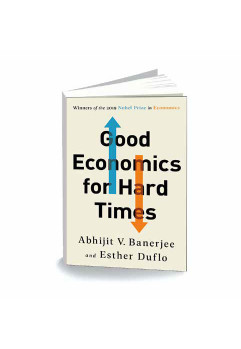READ - GOOD ECONOMICS FOR HARD TIMES
Perhaps the great challenge of our time is learning how to deal with the pressing economic problems today that have made the whole idea of a good life as we have known it at stake.
Immigration and inequality, globalization and technological disruption, slowing growth and accelerating climate change are sources of great anxiety across the world from New Delhi to Dakar to Paris and Washington, DC. The resources to address these challenges are there but what is missing are ideas that will help us jump the wall of disagreement and distrust that divides us. If we succeed, history will remember our era with gratitude. Yet if we fail, the potential losses are incalculable.
In Good Economics for Hard Times, renowned MIT economists Abhijit V. Banerjee and Esther Duflo take on this challenge, building on cuttingedge research in economics which they explain with lucidity and grace.
Questions of economics and economic policy are central to the present crisis. The authors ask: “Is there something that can be done to boost growth? Should that even be a priority for the aff luent West? And what else? What about exploding inequality everywhere? Is international trade the problem or the solution? What is its effect on inequality? What is the future on trade—can countries with cheaper labor costs lure global manufacturing away from China? What about migration? Is there really too much low-skilled migration? What about new technologies? Should we, for example, worry about the rise of artificial intelligence (AI) or celebrate it? And, perhaps most urgently, how can society help all those people the markets have left behind?”
The answers to these problems take more than a tweet, according to Banerjee and Duflo. On that, they comment: “So there is an urge to just avoid them. And partly as a result, nations are doing very little to solve the most pressing challenges of our time; they continue to feed the anger and the distrust that polarize us, which makes us even more incapable of talking, thinking together, doing something about them. It often feels like a vicious cycle.”
“Some good ideas just happened to catch fire, some bad ones as well. Some of the change was accidental, some the unanticipated consequences of something else. For example, part of the increase in inequality was the flip side of the sticky economy, which makes it all the more lucrative to be in the right place at the right time. In turn, the increase in inequality funded a construction boom that created jobs for the unskilled in the cities of the developing world, paving the way to the reduction in poverty,” they add.
Banerjee and Duf lo say, “Bad economics underpinned the grand giveaways to the rich and the squeezing of welfare programs, sold the idea that the state is impotent and corrupt and the poor are lazy, and paved the way to the current stalemate of exploding inequality and angry inertia.”
The authors further note that “Blind economics missed the explosion in inequality all over the world, the increasing social fragmentation that came with it, and the impending environmental disaster, delaying action, perhaps irrevocably.” They cite what John Maynard Keynes, a celebrated macroeconomics theorist wrote: “Practical men who believe themselves to be quite exempt from any intellectual influence, are usually the slaves of some defunct economist.”
Ideas are powerful. Ideas drive change. Banerjee and Duflo write that “Good economics alone cannot save us. But without it, we are doomed to repeat the mistakes of yesterday. Ignorance, intuitions, ideology, and inertia combine to give us answers that look plausible, promise much, and predictably betray us. As history, alas, demonstrates over and over, the ideas that carry the day in the end can be good or bad. We know the idea that remaining open to migration will inevitably destroy our societies looks like it is winning these days, despite all evidence to the contrary.”
They conclude that the only recourse we have against bad ideas is to be vigilant, resist the seduction of the “obvious,” be skeptical of promised miracles, question the evidence, be patient with complexity and honest about what we know and what we can know. Without that vigilance, conversations about multifaceted problems turn into slogans and caricatures and policy analysis gets replaced by quack remedies. The call to action is not just for academic economists—it is for all of us who want a better, saner, more humane world.
About the Authors
Abhijit V. Banerjee is the Ford Foundation International Professor of Economics at the Massachusetts Institute of Technology. Esther Duf lo is the Abdul Latif Jameel Professor of Poverty Alleviation and Development Economics in the Department of Economics at the Massachusetts Institute of Technology. They are the winners of the 2019 Nobel Prize in Economics. Their previous book together is Poor Economics: A Radical Rethinking of the Way to Fight Global Poverty, which won the 2011 Financial Times and Goldman Sachs Business Book of the Year Award.








